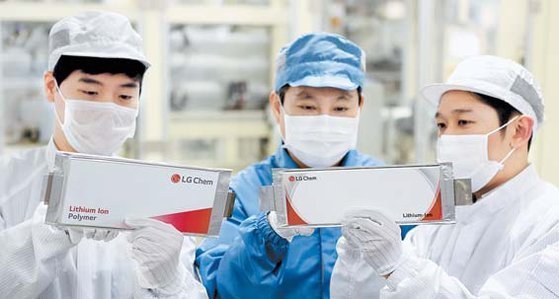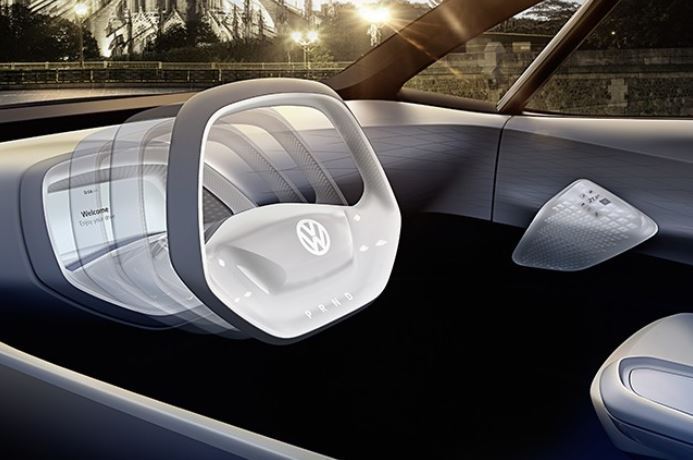USITC decides to open probe amid fierce rivalry among Korean battery makers
By Song Su-hyunPublished : May 30, 2019 - 17:19
The United States International Trade Commission on Thursday announced its decision to institute an investigation into a complaint filed by South Korea’s LG Chem against its domestic rival SK Innovation over alleged misappropriation of trade secrets involving lithium-ion battery technologies.
The decision highlights the rivalry among three Korean battery makers, including Samsung SDI. Competition has grown fiercer in the past couple of years, as the global electric vehicle market is set to grow.
For the next 45 days, the US institution will look into the allegation that SK Innovation violated Section 337 of the Tariff Act of 1930 via importation of certain lithium-ion battery cells, modules and packs into the country by misappropriating LG Chem’s trade secrets.
In the complaint, LG claimed SK imported its trade secrets related to manufacturing EV batteries that will start to be produced at SK’s new factory in Georgia, the US, from 2022. LG alleged the misappropriation of trade secrets took place through the hiring of 76 former LG employees by SK at its headquarters in Korea over the past two years. LG has also sued SK with the District Court of Delaware.
“We welcome the USITC decision to institute the investigation, and hope it helps reveal the competitor’s unfair misappropriation of trade secrets,” LG Chem said in a statement.
The decision highlights the rivalry among three Korean battery makers, including Samsung SDI. Competition has grown fiercer in the past couple of years, as the global electric vehicle market is set to grow.
For the next 45 days, the US institution will look into the allegation that SK Innovation violated Section 337 of the Tariff Act of 1930 via importation of certain lithium-ion battery cells, modules and packs into the country by misappropriating LG Chem’s trade secrets.
In the complaint, LG claimed SK imported its trade secrets related to manufacturing EV batteries that will start to be produced at SK’s new factory in Georgia, the US, from 2022. LG alleged the misappropriation of trade secrets took place through the hiring of 76 former LG employees by SK at its headquarters in Korea over the past two years. LG has also sued SK with the District Court of Delaware.
“We welcome the USITC decision to institute the investigation, and hope it helps reveal the competitor’s unfair misappropriation of trade secrets,” LG Chem said in a statement.

SK Innovation countered in a statement, “The company is engaged in normal business activities in pursuit of the battery industry’s development, and we will seek strong measures to protect our employees, customers, business value and further national interests.”
Since LG took legal action last month, the Korean battery industry has entered a “war of words.”
While LG has highlighted the allegations of trade secret theft, SK has been trying to shift the focus to the legal measure’s alleged impact on national interests.
“By mentioning national interest, the competitor is misleading the nature of the lawsuit,” said a senior official at LG Chem. “The lawsuit will take place under strict protection of the companies’ confidential information by the US institution and also by the Korean government, and there is no need to criticize each other’s corporate culture or others.”
The latest dispute comes in light of recent reshuffles of battery purchasing plans by German automaker Volkswagen, which has so far announced the largest EV platform project with a total of $56 billion of investments.
Volkswagen officially disclosed that battery suppliers for its new EV models would be Samsung SDI and CATL during a media conference last year. LG Chem was unofficially in, too. And the German automaker added SK Innovation late last year. Some of the former LG Chem employees hired by SK Innovation included those who worked for the Volkswagen project, according to LG’s complaint.
Rivalry in the Korean battery industry was first exposed in 2011, when LG Chem and SK Innovation had been in another legal dispute on patents of their battery separator technologies. At the time, it was again LG that had sued SK, but they had reached a settlement.
Competition then heated up in building battery production facilities, as the electric vehicle market started to open, with massive investment plans by automakers. After Samsung announced its completion of a battery plant in Hungary in May 2017, LG started building a facility in Poland in September of the same year. SK followed suit in 2018. Similar investment patterns were shown in China and the US.

“Because the battery plants need to be located in the vicinity of automakers’ assembly lines, there was an excessive race among the three companies to preoccupy right locations and construct plants for the past few years,” said an industry official.
Competition for advanced battery technologies has grown fiercer as well.
Each firm claims the development of high-nickel lithium-ion batteries that are composed of 80 percent nickel in the cathode. The exact timing of mass commercialization has not be released. SK Innovation recently announced its goal of developing batteries with 90 percent nickel by the end of this year.
Some in the industry have called for caution, saying, “Such rivalry seems to be leading to low-price orders, which could undermine the profitability of the industry altogether when the EV market starts to grow.”
Meanwhile, Volkswagen is trying to reduce its reliance on external battery makers by investing 1 billion euros ($1.11 billion) in its own battery development.
The German carmaker reportedly revised its deal with Samsung by cutting the previously 20 gigawatt-hours battery supplies to 5 GWh recently.
“Automakers are seeing the battery as the biggest cost factor, and it’s only the beginning of a cost-down race,” said Yoo Ji-woong, an analyst at Ebest Securities.
“Volkswagen alone would need around 30 trillion won to secure up to 180 GWh batteries by around 2025 for about 3 million electric vehicles as it is planning to. It is already trying to reduce reliance on external battery makers by starting in-house battery development.”
By Song Su-hyun (song@heraldcorp.com)











![[Today’s K-pop] BTS pop-up event to come to Seoul](http://res.heraldm.com/phpwas/restmb_idxmake.php?idx=644&simg=/content/image/2024/04/17/20240417050734_0.jpg&u=)
![[Graphic News] More Koreans say they plan long-distance trips this year](http://res.heraldm.com/phpwas/restmb_idxmake.php?idx=644&simg=/content/image/2024/04/17/20240417050828_0.gif&u=)




![[KH Explains] Hyundai's full hybrid edge to pay off amid slow transition to pure EVs](http://res.heraldm.com/phpwas/restmb_idxmake.php?idx=652&simg=/content/image/2024/04/18/20240418050645_0.jpg&u=20240419100350)

